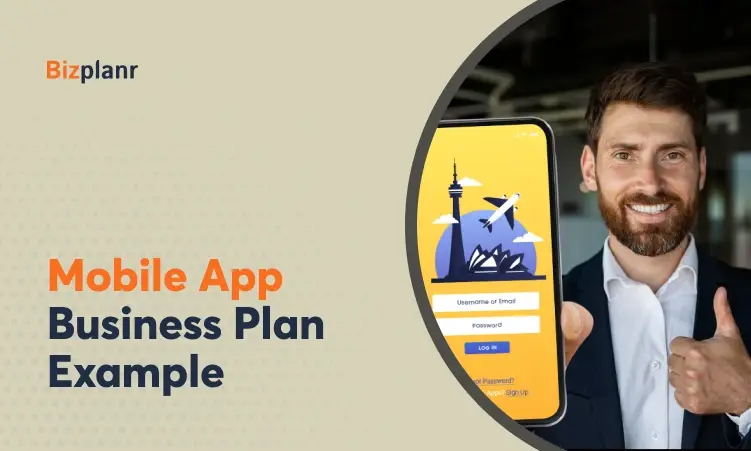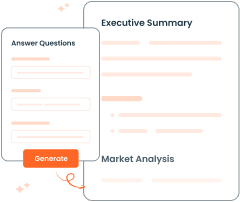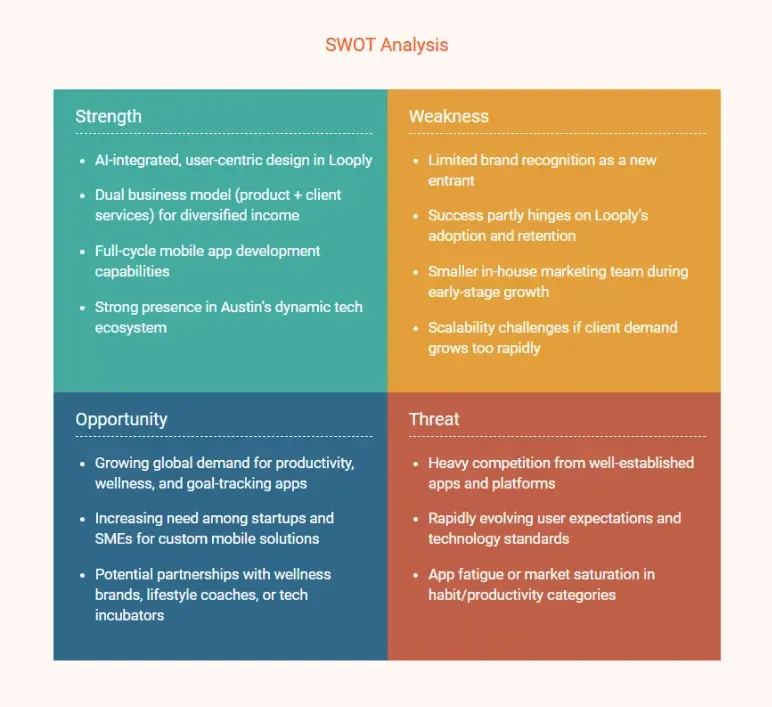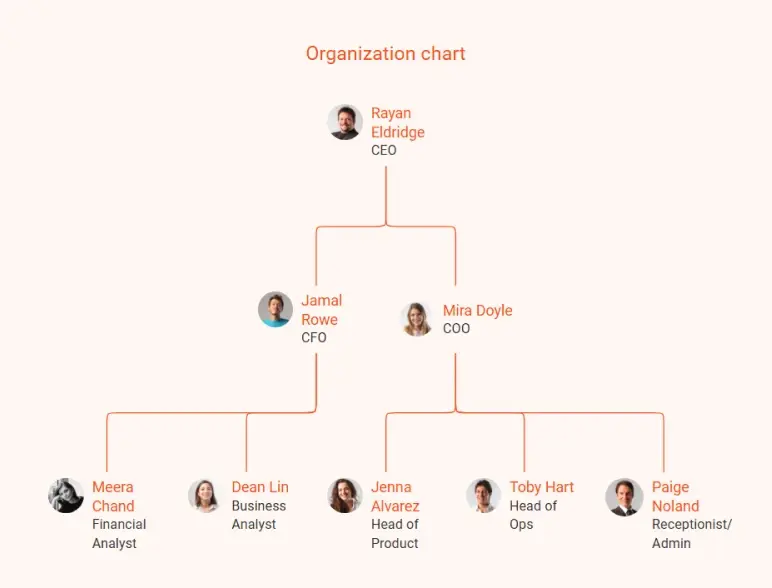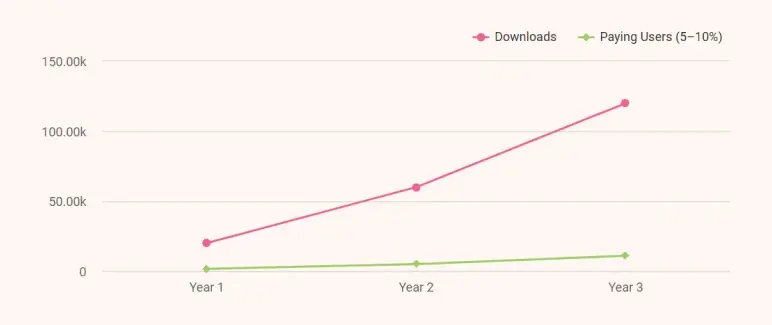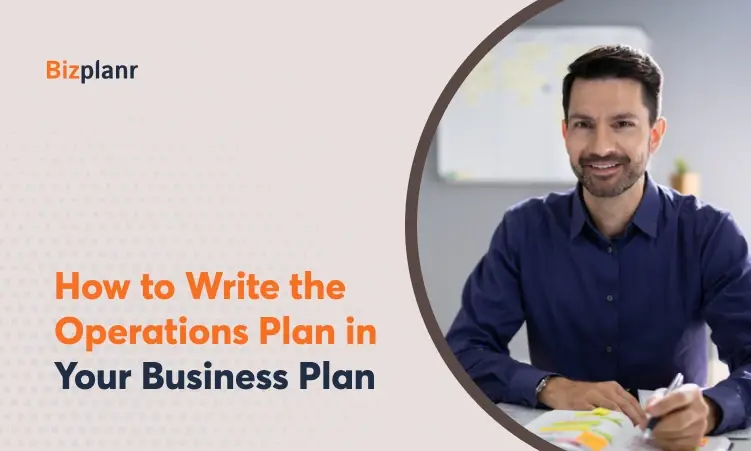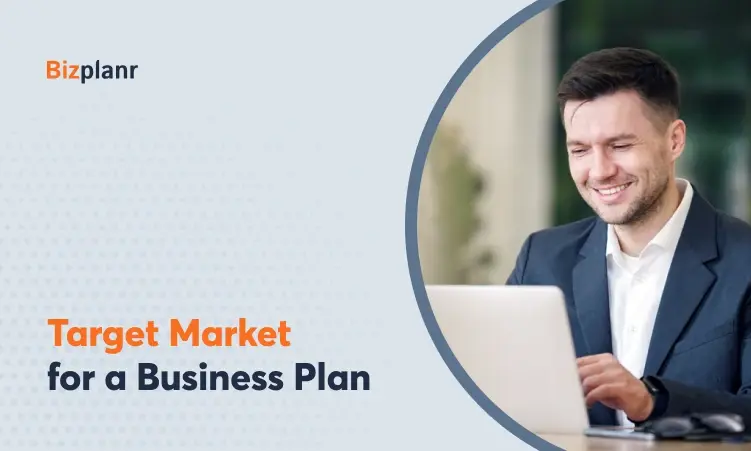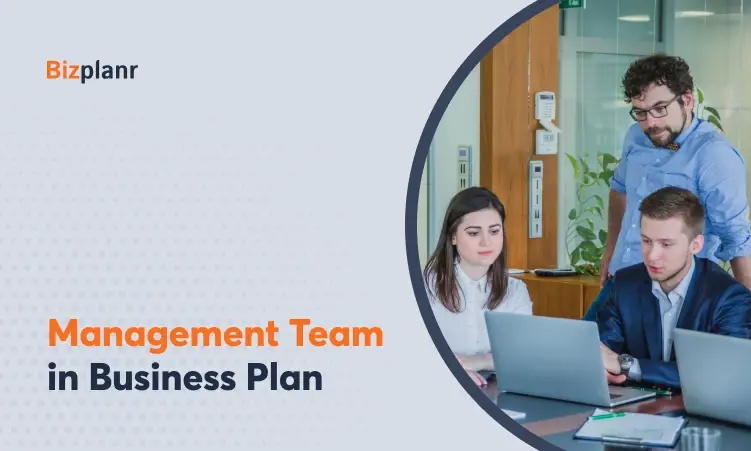Got an app idea and thinking of turning it into a real business?
Great! Because now’s the time. People use apps for everything, and if yours solves a real problem or does something better than what’s out there, you’ve got a shot.
But before you start building or pitching, you need a plan. Something that shows what the app does, how it’ll grow, and how it’ll make money.
Wondering how to draft a plan? Not to worry!
This mobile app business plan example will help you get it done.
Mobile App Business Plan Sample
Explore a sample business plan of Tapfinity Labs, built to inspire and guide your own mobile app startup. Gain clear, actionable insights to write each section with confidence.
1. Executive Summary
Tapfinity Labs is a mobile app development company headquartered in Austin, Texas, focused on delivering user-centric, AI-powered mobile applications.
Operating under a hybrid model, the company builds proprietary digital products, led by its flagship app Looply, while also offering end-to-end app development services for startups and small businesses.
Target Market
Reaching users and businesses that need us most.
- Looply users: Millennials, Gen Z, freelancers, self-improvement seekers
- Client services: Startups, SMEs, personal brands, and digital coaches
Tapfinity appeals to both individuals seeking personal growth tools and companies seeking top-tier mobile solutions.
Core Offerings
Product: Looply
Looply is an intelligent lifestyle and productivity app that helps users build positive habits, set and track goals, and stay organized.
What differentiates Looply is its AI-assisted prompt system that personalizes user experiences, positioning it as a unique solution at the intersection of wellness, personal development, and productivity.
Services Offered
In addition to its in-house product, Tapfinity Labs offers a suite of development services, including:
- Custom app development (native & cross-platform)
- UI/UX design consulting
- Ongoing maintenance & feature rollouts
- App store optimization (ASO)
This dual offering allows Tapfinity to generate revenue through both subscription-based digital products and project-based client work.
Competitive Advantage
What sets Tapfinity apart is its:
- AI-driven personalization
- Seamless integration of productivity + wellness
- High-quality, mobile-first design
- Flexible, founder-friendly app development services
Marketing & Sales Strategy
Growth will be driven through:
- ASO targeting high-intent keywords
- Influencer and affiliate partnerships
- Referral and loyalty programs
- Content marketing and onboarding email sequences
- B2B outreach through startup networks and coworking hubs
Financial Snapshot
Over the next three years, the business shows strong revenue growth from $123,000 in Year 1 to $580,000 in Year 3. Most income comes from two sources: subscriptions and client services.
A quick view of where we’re headed financially:
| Metric | Year 1 | Year 2 | Year 3 |
|---|---|---|---|
| Total Revenue | $123,000 | $330,000 | $580,000 |
| – Looply Subscriptions | $48,000 | $180,000 | $360,000 |
| – Client Services Revenue | $75,000 | $150,000 | $220,000 |
| Gross Profit | $68,000 | $245,000 | $450,000 |
| Net Profit (Loss) | –$52,000 | $77,000 | $235,000 |
| Net Cash Flow | $88,000 | $120,000 | $335,000 |
| Ending Cash Balance | $88,000 | $208,000 | $543,000 |
| Total Liabilities (Year-End) | $5,000 | $8,000 | $10,000 |
Funding Request
Tapfinity Labs is seeking $150,000 in seed funding to:
- Finalize the development of Looply
- Expand its engineering and design team
- Execute paid acquisition campaigns
- Support infrastructure and marketing tools for its first year
Liking the plan you're reading? It's AI generated.
Generate Your Own Using Bizplanr AI
2. Business Description
Tapfinity Labs is a cutting-edge mobile app development company based in Austin, Texas. Structured as an LLC (Limited Liability Company), the company blends intelligent design with technical precision to create mobile applications that improve everyday lives.
Tapfinity operates on two fronts: building its own AI-powered productivity tools like Looply, and delivering custom app development solutions for startups and small businesses aiming to establish a mobile presence.
Mission Statement
To empower users through beautifully designed mobile experiences that blend functionality, simplicity, and impact.
Vision
To become a trusted leader in mobile innovation, helping users improve their lives one tap at a time.
Business Model
Tapfinity Labs employs a hybrid business model:
- Product revenue: Looply is monetized through a freemium model, offering core features for free and unlocking advanced capabilities through premium subscriptions.
- Service revenue: The company also generates revenue by providing full-cycle mobile app development services—covering ideation, UI/UX design, engineering, deployment, and ongoing maintenance—for external clients.
Founding Story
Tapfinity Labs was born from a simple but powerful idea: mobile apps should do more than just function—they should inspire, guide, and simplify users’ lives.
Recognizing the fragmented state of existing habit trackers and productivity tools, founder Rayan Eldridge set out to create Looply, an elegant solution that combines user-centered design with AI-driven functionality. This ethos of purposeful innovation became the foundation of Tapfinity Labs.
Core Values
Here are the core values that shape everything we create and stand for:
- User-first design: Every feature is built with real user needs in mind.
- Simplicity with depth: Interfaces are intuitive, yet the tech behind them is deeply sophisticated.
- Innovation-driven: AI, automation, and cloud integration are central to every product and service.
- Collaboration: Clients aren’t just customers—they’re partners.
- Integrity and transparency: Open communication and ethical practices guide our work.
Growth Objectives
In the next 12–24 months, Tapfinity Labs aims to:
- Successfully launch Looply on iOS and Android platforms
- Achieve 100,000 active users with a 5–10% conversion to premium
- Onboard 15+ new client projects in custom app development
- Expand its engineering and design team to support product iteration and service delivery
- Position itself for acquisition or strategic partnership opportunities
3. Market Analysis
Industry Overview
The global mobile app industry continues to experience explosive growth, driven by rising smartphone penetration, remote work trends, and increasing consumer demand for on-the-go digital tools.
The global mobile app market is projected to reach $673.8 billion by 2027, growing at a CAGR of 12.2% from 2022 to 2027.
Key industry drivers include:
- The widespread adoption of AI-powered applications that enhance personalization and automation.
- Increased investment from enterprises and startups in mobile-first solutions.
- Demand for habit tracking, mental wellness, and goal-setting apps amid growing public focus on personal development and productivity.
Target Market
Tapfinity Labs serves two primary audiences:
Looply app users:
- Millennials and Gen Z individuals focused on self-improvement
- Entrepreneurs, solopreneurs, and freelancers seeking productivity tools
- Health and wellness enthusiasts who value habit-building and mindfulness
- Personal coaches and lifestyle consultants who recommend digital tracking tools
Service clients:
- Startups and SMEs needing scalable, cross-platform app solutions
- Non-tech founders looking for UI/UX consulting, prototyping, and app launches
- Businesses outsourcing their app development to reduce cost and time to market
This dual-market approach enables Tapfinity to tap into both the B2C and B2B revenue streams, offering stability and diversified growth potential.
Competitive Analysis
Tapfinity Labs competes within two overlapping markets: the habit/productivity app space and mobile app development services.
Key competitors for Looply:
- Fabulous – Habit formation through coaching-based journeys
- Habitica – Gamified approach to habits
- Todoist / Trello / Notion – Productivity and task management with a limited habit-centric focus
- Headspace – Focused on mental wellness, not task planning
What sets Looply apart:
- AI-assisted daily prompts and personalized nudges
- A unified experience that combines goal-tracking, productivity, and wellness
- Sleek, mobile-native UI designed with simplicity and engagement in mind
Competitors in app development services:
- Independent app studios and freelance developers
- Large outsourcing firms with less design agility or startup alignment
SWOT Analysis
4. Services Offered
The core services of Tapfinity Labs are as follows:
Looply App
Looply is Tapfinity Labs’ flagship mobile application designed to help users build habits, track goals, and boost productivity—all in one seamless experience.
Targeted at individuals seeking personal growth and efficiency, Looply stands out through its clean design, intuitive navigation, and powerful AI-assisted prompts that adjust to user behavior and preferences.
Core features:
- Habit tracker – Daily, weekly, and custom habit routines
- Goal setting & progress visualization – Short- and long-term personal goals
- AI-assisted prompts – Smart reminders and motivational nudges
- Productivity tools – To-do lists, prioritization, and scheduling
- Personal analytics – Performance metrics and insights
- Freemium model – Free basic features with paid premium upgrades
Looply is available on iOS and Android platforms and integrates easily with calendar tools and wellness apps.
Custom Mobile App Development Services
Native & cross-platform app development
Tapfinity provides customized development solutions using React Native, Flutter, Swift, and Kotlin. Services cover MVPs, full-scale apps, and backend systems for clients in the lifestyle, health, productivity, and education industries.
UI/UX design consulting
Clients benefit from professional app wireframing, prototyping, and user flow optimization focused on simplicity and user engagement. Tapfinity emphasizes human-centered design principles to enhance user satisfaction and retention.
App maintenance & feature rollouts
Ongoing support includes bug fixes, scalability updates, API integrations, and regular feature expansions to help clients maintain high performance and security.
App store optimization (ASO)
Tapfinity helps clients boost visibility in app stores through metadata refinement, creative visuals, keyword strategies, and A/B testing.
Monetization Strategy
Looply operates on a freemium model with optional in-app purchases and subscriptions that unlock enhanced features such as:
- Advanced analytics
- Personalized habit suggestions
- Syncing across devices
- Priority customer support
Additionally, Tapfinity generates revenue through B2B service contracts for mobile development projects.
5. Marketing and Sales Strategy
Marketing Plan
Tapfinity Labs employs a dual-pronged marketing approach—one aimed at acquiring and retaining Looply users (B2C) and another focused on attracting app development clients (B2B).
Looply user acquisition (B2C)
Tapfinity Labs’ marketing strategy focuses on growth through multiple high-impact channels:
| Strategy | Description |
|---|---|
| App Store Optimization (ASO) | Target high-volume keywords like “habit tracker,” “goal planner,” and “daily organizer.” Optimize app titles, descriptions, screenshots, and icons to boost visibility in app stores. |
| Influencer Marketing | Collaborate with YouTubers, TikTok creators, and wellness bloggers to create authentic content that highlights Looply’s core features and real-life benefits. |
| Content Marketing | Launch a branded blog covering self-improvement, habit-building, productivity hacks, and mobile lifestyle tips—each post driving engagement with Looply. |
| Referral & Rewards Program | Incentivize users to refer friends by offering unlockable premium features, discounts, or digital gift cards—supporting viral user acquisition. |
| Email & Onboarding Automation | Use segmented email sequences and in-app automation to onboard users, drive engagement, and convert free users to premium subscribers with personalized AI-driven prompts. |
| Launch Platforms & PR | Launch on platforms like Product Hunt and Betalist, and secure coverage in TechCrunch and other relevant tech media to build buzz and early credibility. |
Client acquisition for services (B2B)
To attract high-intent service clients, Tapfinity Labs employs a focused B2B acquisition strategy targeting startups and emerging businesses:
Targeted B2B outreach
Direct email campaigns and LinkedIn prospecting aimed at startups, solopreneurs, and small businesses seeking mobile solutions.
Portfolio website and case studies
A professional web presence showcasing past work, client testimonials, and detailed project case studies.
Partnerships with accelerators and co-working spaces
Collaborate with tech incubators and startup hubs in Austin and beyond to provide app development services to early-stage founders.
Sales Strategy
Tapfinity Labs' sales strategy is designed to maximize conversions, client value, and long-term relationships:
| Strategy | Description |
|---|---|
| Freemium to Premium Conversion | Offer free access to core Looply features; use in-app nudges, feature gates, and progress limitations to encourage premium upgrades. |
| Consultative Sales | Engage each client through discovery sessions to understand their goals and offer tailored packages for MVPs, redesigns, or full-scale builds. |
| Upsell Services | Increase client lifetime value by offering add-ons such as maintenance plans, UX iterations, or analytics/reporting integrations. |
| Client Loyalty Programs | Reward returning or referring clients with discounts or added value services, encouraging retention and word-of-mouth growth. |
6. Organization and Management
Tapfinity Labs is registered as a Limited Liability Company (LLC) in the state of Texas. This structure offers the business both flexibility in management and protection of personal assets for its owners.
Ownership
The company is privately owned by its founder and CEO, Rayan Eldridge. As the majority stakeholder, Rayan leads strategic direction, product development, and client engagement efforts.
Management Team
Rayan Eldridge – CEO (Founder & Product Strategist)
Rayan is the visionary behind Tapfinity Labs and the architect of Looply. With a background in mobile UX and digital innovation, he oversees the company’s product roadmap, client relations, and overall business growth.
Mira Doyle – COO (Operations Manager)
Mira is responsible for the day-to-day operations of the business, ensuring smooth workflow between development, design, and client-facing teams. Her operational acumen supports project delivery and resource planning.
Jamal Rowe – CFO (Accountant)
Jamal manages financial planning, budgeting, and forecasting. He also oversees investor relations and ensures compliance with regulatory and accounting standards.
Paige Noland – Receptionist/Admin
Paige handles administrative support, scheduling, and internal communications, playing a key role in maintaining organizational efficiency.
External Advisor
Ava Rosner
Ava serves as a strategic advisor, contributing insights in mobile innovation, go-to-market strategies, and funding preparation. Her experience in scaling tech startups provides valuable guidance to Tapfinity’s executive team.
Organizational Chart
7. Financial Projections
Tapfinity Labs has developed 3-year financial projections to support its growth strategy and demonstrate financial sustainability.
Profit & Loss Statement
The projected income statement outlines Tapfinity Labs’ expected revenue, cost of goods sold, operating expenses, and profitability over the next three years.
| Category | Year 1 | Year 2 | Year 3 |
|---|---|---|---|
| Revenue | |||
| Loophy Premium Subscriptions | $48,000 | $180,000 | $360,000 |
| Client Services Revenue | $75,000 | $150,000 | $220,000 |
| Total Revenue | $123,000 | $330,000 | $580,000 |
| Cost of Goods Sold (COGS) | |||
| Development & Hosting Costs | $25,000 | $40,000 | $60,000 |
| Contractor Payments | $20,000 | $45,000 | $70,000 |
| Total COGS | $55,000 | $85,000 | $130,000 |
| Gross Profit | $68,000 | $245,000 | $450,000 |
| Operating Expenses | |||
| Marketing & Advertising | $40,000 | $50,000 | $60,000 |
| Salaries & Wages | $60,000 | $90,000 | $120,000 |
| Admin & Tools | $15,000 | $20,000 | $25,000 |
| Misc. Operational Costs | $5,000 | $8,000 | $10,000 |
| Total Operating Expenses | $120,000 | $168,000 | $215,000 |
| Net Profit (Loss) | ($52,000) | $77,000 | $235,000 |
Cash Flow Statement
The cash flow statement highlights Tapfinity Labs’ ability to generate and manage liquidity. It details expected cash inflows from operations and funding and planned outflows for development, marketing, and team expansion.
| Category | Year 1 | Year 2 | Year 3 |
|---|---|---|---|
| Cash Inflows | |||
| Seed Investment | $150,000 | - | - |
| Revenue from Operations | $123,000 | $330,000 | $580,000 |
| Total Inflows | $273,000 | $330,000 | $580,000 |
| Cash Outflows | |||
| Product Development | $50,000 | $35,000 | $30,000 |
| Marketing & Sales Spend | $40,000 | $50,000 | $60,000 |
| Salaries & Team | $60,000 | $90,000 | $120,000 |
| Cloud Tools & Infrastructure | $25,000 | $20,000 | $20,000 |
| Admin & Other Expenses | $10,000 | $15,000 | $15,000 |
| Total Outflows | $185,000 | $210,000 | $245,000 |
| Net Cash Flow | $88,000 | $120,000 | $335,000 |
| Ending Cash Balance | $88,000 | $208,000 | $543,000 |
Balance Sheet
The projected balance sheet presents Tapfinity Labs’ expected financial position at year-end over the first three years of operation.
| Category | Year 1 | Year 2 | Year 3 |
|---|---|---|---|
| Assets | |||
| Cash | $88,000 | $208,000 | $543,000 |
| Equipment & Tools (depreciated) | $5,000 | $4,000 | $3,000 |
| Accounts Receivable | $10,000 | $18,000 | $30,000 |
| Total Assets | $103,000 | $230,000 | $576,000 |
| Liabilities | |||
| Accounts Payable | $5,000 | $8,000 | $10,000 |
| Short-term Loans | - | - | - |
| Total Liabilities | $5,000 | $8,000 | $10,000 |
| Owner's Equity | $98,000 | $222,000 | $566,000 |
User Acquisition Growth Projection
As shown in the chart:
- Downloads are expected to grow from 20,000 in Year 1 to 120,000 by Year 3.
- A 5–10% conversion rate to paying users supports subscription-based revenue projections of $48,000 in Year 1, scaling to $360,000 by Year 3.
This projection validates the app’s revenue potential and demonstrates a scalable path to profitability.
8. Funding Request
Funding amount requested: $150,000
Stage: Seed Round
Structure: Convertible note or SAFE (flexible depending on investor preferences)
Purpose of Funding
Tapfinity Labs is seeking $150,000 in seed funding to finalize the development and launch of its flagship mobile app, Looply, and to scale operations for both product and service arms of the business.
This initial capital will be used to execute key milestones that ensure a successful market entry and sustainable growth through the first year.
Allocation of Funds
The breakdown of fund usage is given below:
| Use of Funds | Estimated Allocation |
|---|---|
| Final App Development & QA | $40,000 |
| Engineering Team Expansion | $35,000 |
| Paid User Acquisition Campaigns | $30,000 |
| Marketing Automation & Tools | $15,000 |
| Cloud Hosting & Infrastructure | $10,000 |
| Legal, Compliance, and Admin | $10,000 |
| Contingency & Miscellaneous | $10,000 |
Return Potential for Investors
While in the early stage, Tapfinity Labs projects scalable revenue through Looply’s freemium-to-premium user model and repeat client contracts for mobile development services.
The dual revenue stream strategy enhances early profitability potential. With planned product exposure, strong demand for mobile productivity tools, and an exit strategy focused on acquisition by a larger tech or SaaS firm, early investors can expect attractive returns over a 3–5 year horizon.
Download the Free Mobile App Business Plan Template
Want to create a business plan for your app but need a little help with the format and content? We’ve got your back. Download our free mobile app business plan template (PDF) and start building your plan with ease.
This easy-to-edit template walks you through all the key sections, like your app’s mission, user acquisition strategy, monetization plan, and financial projections. You can customize it to match your app idea, target market, and business goals.
Conclusion
Now that you’ve gone through this example, writing a business plan for a mobile app company should feel a lot more doable.
Start with the basics, keep things clear, and focus on how your app solves a real problem and earns money.
However, if you’re still feeling stuck or short on time, consider using an AI-powered business plan generator like Bizplanr. It helps you build a complete, professional plan in minutes, just answer a few quick questions about your app, and you’re good to go!
Get Your Business Plan Ready In Minutes
Answer a few questions, and AI will generate a detailed business plan.
Frequently Asked Questions
Do I really need a business plan for a mobile app company?
Yes. A business plan for a mobile app company helps you stay focused. It explains what your app does, who it helps, how it makes money, and what sets it apart. It’s also useful when you need to:
- Pitch to investors
- Set realistic goals
- Avoid wasting time or money
- Build with a clear strategy
Even if you’re not raising funds, a good plan helps you stay focused.
Why conduct market analysis before launching a mobile app business?
Because you need real insight before you build. Market analysis helps you understand your users, what they need, and what other apps are already out there. It also shows where the demand is and where the gaps are. This way, you can shape your app with purpose and avoid wasting time on features no one wants.
How long does it take to complete your mobile app business plan?
If you're doing it yourself, 5 to 10 days is what it takes, especially if you're starting from scratch and need time for research, writing, and revisions. However, using business planning tools can simplify the process. With pre-defined guides, templates, and step-by-step prompts, you can put together a solid plan much faster, sometimes in under an hour.
Can I adapt my app startup business plan?
Yes, you should, especially when your business goes through major changes. If you add new features, shift your pricing, target a different user base, or update your growth strategies and financial projections, your plan needs to reflect those changes.
What common mistakes should be avoided while writing a plan?
Here are a few common business plan writing mistakes to watch out for:
- Skipping market research
- Being vague about your revenue model
- Ignoring the competition
- Writing for yourself instead of your audience (like investors)
- Making it too long or too complex
